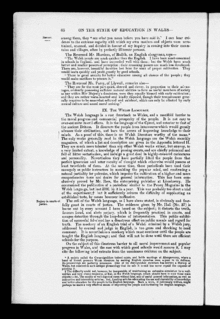
Back Brad y Llyfrau Gleision AST Brad y Llyfrau Gleision Catalan Brad y Llyfrau Gleision Welsh Brad y Llyfrau Gleision Spanish

The Reports of the Commissioners of Inquiry into the State of Education in Wales, commonly referred to in Wales as the "Treason of the Blue Books" or "Treachery of the Blue Books" (Welsh: Brad y Llyfrau Gleision) or just the "Blue Books" are a three-part publication by the British Government in 1847, which caused uproar in Wales for disparaging the Welsh; being particularly scathing in its view of the nonconformity, the Welsh language[1]: 2 and the morality of the Welsh people in general. The Welsh sobriquet Brad y Llyfrau Gleision was from the name of a play satirising the reports, and those who gave evidence to the inquiry, which was published seven years after the reports. The Welsh Academy Encyclopaedia of Wales says that the name "took hold of the public imagination to such an extent that ever since the report has been known by that name".[2]: 881–2
According to the author and business academic,[3][4] Simon Brooks, the Blue Books are regarded today as "colonial diktat", and are "the most important ideological intervention by the British state in Wales in the 19th century."[1]: 76 However the inquiry did not lead to any governmental action and the hostile reaction was mainly aimed at the comments about Welsh morality.[5]: 96 One of the many legacies of the reports that prominent Welsh nationalist activist Saunders Lewis opined in The Fate of the Language in 1962 was that Wales embraced bilingualism, through the requirement to learn English as a second language.[6][1]: 79
- ^ a b c Cite error: The named reference
Why Wales Never Waswas invoked but never defined (see the help page). - ^ Cite error: The named reference
TWAEoWwas invoked but never defined (see the help page). - ^ Jones, Moya (14 September 2018). "Review of Why Wales Never Was: the Failure of Welsh Nationalism by Simon Brooks". Revue Française de Civilisation Britannique. 23 (2). doi:10.4000/rfcb.2247. S2CID 166085679. Retrieved 11 September 2021.
- ^ Williams, Huw (17 July 2015). "Pam Na Fu Cymru – Why Wales Never Was". iwa. Retrieved 8 September 2021.
- ^ Johnes, Martin (2019). Wales: England's Colony?: The Conquest, Assimilation and Re-creation of Wales. Parthian. ISBN 978-1912681419.
- ^ Jones, Alun R., Thomas, Gwyn, Presenting Saunders Lewis, UoW Press, 2nd ed 1983, ISBN 0-7083-0852-X, p 130